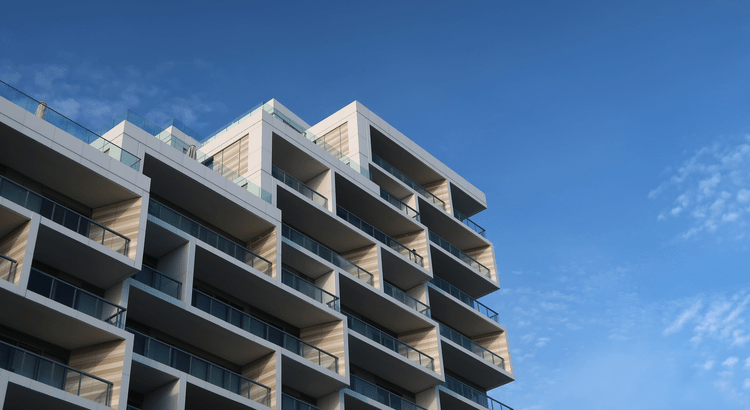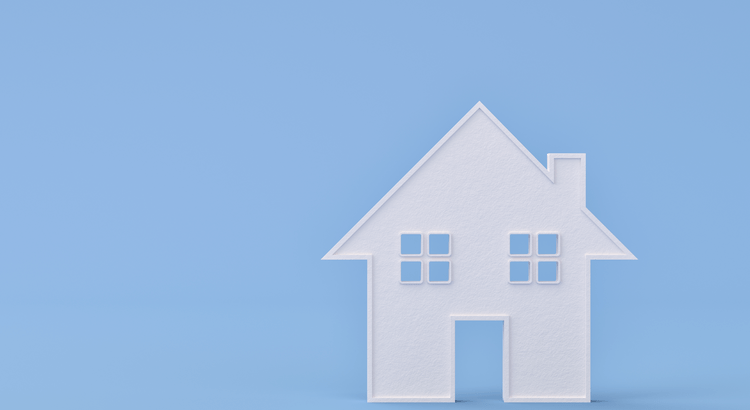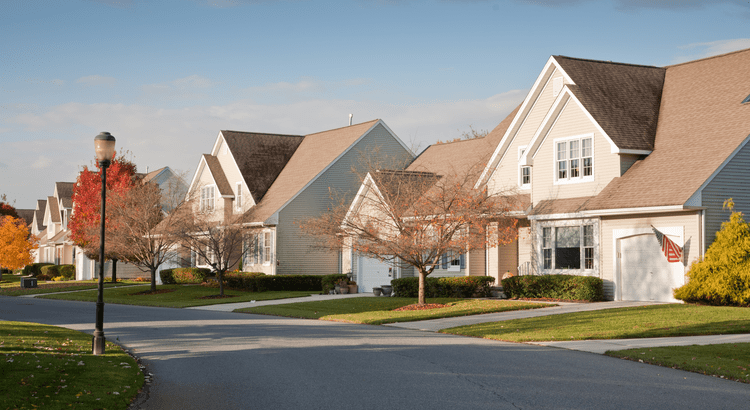
Why a Condo Could Be Your Perfect First Home
Why a Condo Could Be Your Perfect First Home If you’re looking to break into homeownership but the price of single-family homes has you second-guessing, you might want to consider a condominium (condo) or townhome. These types of homes often come with a lower barrier to entry – and that can help you start to build equity and enjoy the benefits of owning a home sooner. Since they're usually smaller than single-family homes, they can be easier on your wallet. While it’s not always the case, smaller square footage usually comes with a smaller price tag too. As a result, according to the latest data from Realtor.com, condos typically have a lower asking price than single-family homes (see graph below): And here’s some exciting news: builders are focusing more on homes like these. The National Association of Home Builders (NAHB) says: “The share of townhomes being built is at an all-time high.” That means there’s a good number of options to add to your home search if you broaden it to include condos and townhomes. And you may even find something that works better for your budget. So, if you're comfortable with a smaller space and want to buy your first home before the spring rush, adding these types of homes to your search might be your answer. The Perks of a Condo Lifestyle Living in a condo has a bunch of other perks, too. Let’s look closer at why condos are appealing for first-time buyers: They help you start building equity. When you buy a condo or townhome, you build equity and your net worth as you make your mortgage payments and as your condo’s value goes up over time. They can be low maintenance. Condos are great if you want to own your place but don't want to mow the lawn, shovel snow, or fix the roof. Your real estate agent can help explain any associated fees and details for the condos you’re interested in. They usually come with a range of amenities. Your condo might come with access to a pool, dog park, or parking. And the best part? You don’t have to take care of any of them. They create a sense of community. Buying a condo means you'll be living close to other people, which is nice if you want a more close-knit feel. Many communities like these hold fun events such as barbecues and parties to help create that sense of connection among residents. Remember, your first home doesn't have to be the one you stay in forever. The important thing is to get your foot in the door as a homeowner so you can start to gain home equity. Later on, that equity can help you buy another place if you want something different. Ultimately, owning and living in a condo or townhome is a lifestyle choice. If you want to see if it makes sense for you, talk to a local real estate agent. Bottom Line Ready to find a home that suits your goals? A condo might be the perfect fit for your first home purchase. Let’s connect today to start your search.

Why Buying a Home Beats Renting in These Top Cities: A Detailed Look at Monthly Savings
Why Buying a Home Beats Renting in These Top Cities: A Detailed Look at Monthly Savings If you're wondering whether buying a home or continuing to rent is the smarter financial move, you're not alone. The debate between renting and buying continues to be a hot topic, especially with fluctuating interest rates and home prices. However, a recent study shows that in 22 out of the top 50 metro areas in the U.S., owning a home is more affordable than renting. Let's break down the data, explore specific cities—including Louisville—and see how much you can save by becoming a homeowner. Monthly Savings: Buying vs. Renting in Top Cities Here’s a snapshot of some of the cities where owning a home could save you the most money compared to renting: New Orleans, LA: Homeowners save an impressive $446 per month compared to renters. Chicago, IL: Residents save $434 a month by choosing to buy. Pittsburgh, PA: Homeownership leads to a monthly savings of $321. Miami, FL: Buying a home can save you $314 per month. Memphis, TN: You’ll save $300 each month if you own rather than rent. Cleveland, OH: Buyers save $265 per month. Detroit, MI: Homeownership can help you save $213. Tampa, FL: Residents save around $191 each month. Oklahoma City, OK: You can save $188 by buying instead of renting. Houston, TX: Homeowners save $182 monthly in Houston. Birmingham, AL: You’ll pocket $153 per month with a mortgage. For those of you in Louisville, KY, the savings may be a bit smaller, but they are still significant. By owning a home in Louisville, you can save $89 each month compared to renting. While the savings aren’t as large as some of the bigger metro areas, they still make a strong case for homeownership, especially when you consider the long-term financial benefits. Other Cities Where Buying Can Save You Money Here are some additional cities where the study found that buying is more affordable than renting: Indianapolis, IN: You’ll save $152 per month. St. Louis, MO: Buying saves you $139 monthly. Cincinnati, OH: Homeowners in Cincinnati save $81 each month. Orlando, FL: You’ll save $81 monthly as a homeowner. New York, NY: Despite being a pricey market, homeowners can still save $72 compared to renting. Hartford, CT: Homebuyers can save $70 per month. San Antonio, TX: Monthly savings are $66 when owning instead of renting. Philadelphia, PA: Though a smaller savings of $24, it’s still more affordable to buy here. Virginia Beach, VA: Residents save about $10 per month. Buffalo, NY: While savings are modest at $8, homeownership still beats renting. What This Means for You If your city is on this list, it’s time to take a closer look at your housing options. For those in Louisville, while the immediate monthly savings might not be as eye-popping as in New Orleans or Chicago, you’re still looking at nearly $100 in monthly savings—and that adds up. Plus, homeownership comes with long-term benefits, including property appreciation, tax deductions, and building equity, making it a sound financial investment. Even If Your City Isn’t Listed If your city didn’t make the list, don’t fret! Real estate markets are dynamic, and there’s a good chance your area may join this group soon. It’s a good idea to set financial goals now and get prepared so you can take advantage of buying opportunities when the time is right. A Market in Transition According to Orphe Divounguy, Senior Economist at Zillow, now is an excellent time to evaluate your financial situation. "It’s a great time to see how your affordability has changed and if it makes more sense to buy than rent," Divounguy says. With the current mortgage interest rates and housing trends, homeownership is becoming more affordable in many U.S. metro areas, despite the economic shifts. Is It Time for You to Buy? For many, the idea of leaving behind renting for good is becoming more feasible. The data shows that in many U.S. metro areas, homeownership not only offers financial benefits but also provides long-term security and equity-building opportunities. If you're curious about how the math works out in your city, it might be the perfect time to connect and explore your options. If you’re ready to discuss the numbers and explore whether buying makes more sense than renting in Louisville or any other city, let’s connect. We can run the calculations together and see how homeownership could benefit you in the short and long term. Source: Data from Zillow’s September 2024 analysis comparing mortgage payments with rent across the top 50 U.S. metro areas, assuming a 20% down payment and a 30-year fixed mortgage at a 6.5% interest rate.

How Much Does It Cost To Sell My House?
How Much Does It Cost To Sell My House? If you’re toying with the idea of selling your house, you’re probably wondering how much it’ll cost. To be honest, the final number will depend on several factors like the offer you accept, if you help with your buyer’s closing costs, how many repairs you tackle, and more. So, to give you a ballpark of what to expect, here’s some information on a few of the expenses you’ll want to be ready for (see graph below): But here’s something that puts those costs into perspective. Most homeowners today have a substantial amount of equity built up in their homes, and that means they stand to make significant gains when they sell. Chances are, you do too. This can help quickly recoup these selling costs. You may even have enough equity leftover to put some toward your next home purchase too. Let’s dive into a few of the costs from the graph above, so you have a bit more context on what they include and where you may be able to save some money, when it makes sense. Closing Costs and Commission These are the fees you’ll pay at the closing table to cover various aspects of the sale. You’ll have your own closing costs and you may even offer to pay some of the buyer’s as a concession. As U.S. News Real Estate explains: “Closing costs are fees that are paid to finalize the transaction and transfer ownership of the home to the buyer . . . Sellers can expect to pay 2% to 4% of the sale price of the home in fees and taxes on top of the agent commission. Based on the national median home sale price, this means that closing costs in 2023 for sellers are about $7,740 to $15,480. . .” Taxes are going to vary by state and agent commissions depend on what you agree upon upfront. And keep in mind, that the numbers in the chart above are just an example, not exact figures. Not to mention, if you put money toward things like your property taxes, mortgage escrow, etc. as part of your current mortgage payments – there's a chance you’ll get a credit back at closing that can help offset some of these selling expenses. Pre-Listing Inspection and Repairs One optional step some sellers take is having a pre-listing inspection. It gives you an idea of what may pop up later on in the buyer’s inspection – because those are the items a buyer may ask you to toss in a credit (or concession) to cover later on. This allows you to get a jump on any repairs and tackle them before you list, so your house is set up to impress from the start. Again, if you want to skip this step, an agent can help. They’ll be able to give you advice on things like paint colors, small cosmetic repairs, what buyers are looking for, and whether it’s worth tackling anything else ahead of time. This will help make sure you’re spending money on things that are most likely to net you a solid return on your investment. Home Staging As inventory grows, you may want to take a few extra steps to make sure your house stands out. Staging is an optional way to make sure your house shows well. It can include bringing in rental furniture if the house is vacant or art to warm up the walls. Some staging can even be done virtually once the photos are taken. But, in general, how much does it cost? According to Bankrate: “Home sellers typically pay somewhere between $782 and $2,817 in home staging costs . . . but the price tag can vary widely.” If you want to skip this step, you could opt to lean on your agent’s advice for what looks good and what may feel cluttered. A great agent will suggest things like removing a chair to open up the flow of a room, laying down a rug to add warmth to a space, or taking down photographs to de-personalize strategic areas. Why Leaning on an Agent Is Key If you’re looking to cut down on your costs, you have options. But be careful of where you trim. You may be able to skip staging or a pre-listing inspection since those are optional, but you don’t want to skimp and sell without a pro. An agent is your go-to expert throughout the transaction. They’ll offer customized advice every step of the way, including how to stage the house and what repairs to tackle. This can help you avoid hiring an outside stager or having to pay for a pre-listing inspection. But that’s not the only way your agent adds value. They’ll also create tailored marketing and pricing strategies that’ll highlight the house’s best assets and any work you did to get the home show ready. And that can actually help your house sell for more in the long run. Bottom Line Want a better picture of what you should expect when you sell your house? Let’s have a conversation and walk through it together.

Two Reasons Why the Housing Market Won’t Crash
Two Reasons Why the Housing Market Won’t Crash You may have heard chatter recently about the economy and talk about a possible recession. It's no surprise that kind of noise gets some people worried about a housing market crash. Maybe you’re one of them. But here’s the good news – there’s no need to panic. The housing market is not set up for a crash right now. Real estate journalist Michele Lerner says: “A housing market crash happens when home values plummet due to a lack of demand for homes or an oversupply.” With that definition in mind, here are two reasons why this just isn’t on the horizon. 1. Demand for Homes Is Higher than Supply One of the biggest reasons the housing market crashed back in 2008 was an oversupply of homes. Today, though, it’s a very different story. It’s a general rule of thumb that a market where supply and demand are balanced has a six-month supply of homes. A higher number means supply outpaces demand, and a lower number means demand outpaces supply. The graph below uses data from NAR to put today’s situation into context: The graph compares housing supply during three different periods of time. The red bar shows there were 13 months of supply before the 2008 crisis, which was far too much. The gray bar shows a balanced market with six months of supply, for context. And the blue bar shows there are only 4.2 months of supply today. Put simply, there are more people who want to buy homes than there are homes available to buy right now. So, demand is greater than supply. When that happens, home prices stay steady or rise – the opposite of a housing market crash. It’s important to note that inventory levels differ from market to market. Some areas may be more balanced, while a few could have a slight oversupply, which can impact prices locally. However, most markets continue to experience a shortage of homes. Lawrence Yun, Chief Economist at the National Association of Realtors (NAR), says: “We simply don’t have enough inventory. Will some markets see a price decline? Yes. [But] with the supply not being there, the repeat of a 30 percent price decline is highly, highly unlikely.” 2. Unemployment Is Still Low When people are unemployed, they’re more likely to have trouble making their mortgage payments and may be forced to sell or face foreclosure. That was a big problem during the 2008 financial crisis. Today, the employment situation is much more stable (see graph below): Again, this graph shows three different periods of time, but this one is the unemployment rate. The red bar represents the 2008 financial crisis when unemployment was very high at 8.3%. The gray bar shows the 75-year average of 5.7%. And the blue bar shows the unemployment rate today, and it’s much lower at just 4.1%. Right now, people are working, earning an income, and making their mortgage payments. That’s one reason why the wave of foreclosures that happened in 2008 isn’t going to happen again this time. Plus, since so many people are employed right now, many are actually in a position to buy a home, and this demand keeps upward pressure on prices. Today’s Housing Market Is Stronger than in 2008 While it’s understandable to be concerned when you hear talk of a recession and economic uncertainty, but know this: the housing market is in a much better place than it was in 2008. According to Rick Sharga, Founder and CEO at CJ Patrick Company: “Literally everything is different about today’s housing market dynamics than the conditions that led to the housing crisis.” Demand for homes still outpaces supply, and unemployment remains low. And these are two key factors that will help prevent the housing market from crashing any time soon. Bottom Line The housing market is doing a lot better than it was in 2008, but it’s important to remember that real estate is very local. So, it’s always a good idea to stay informed about our specific market. If you have any questions or want to discuss how these factors are playing out in our area, feel free to reach out.
Categories
Recent Posts










